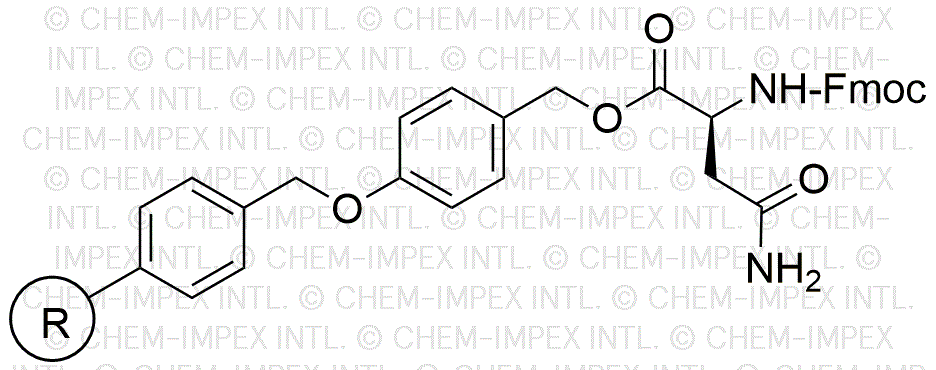Na-Fmoc-L-asparagine 4-alkoxybenzyl alcohol resin is widely utilized in research focused on
- Peptide Synthesis: This resin is essential in solid-phase peptide synthesis, allowing researchers to efficiently create peptides with specific sequences for various applications in biochemistry and pharmacology.
- Drug Development: It plays a crucial role in the development of peptide-based drugs, enabling the design of therapeutics that target specific biological pathways, which can lead to more effective treatments.
- Bioconjugation: The resin facilitates the attachment of peptides to other molecules, such as antibodies or drugs, enhancing their delivery and efficacy in targeted therapies.
- Research in Neuroscience: By synthesizing neuropeptides, this resin aids in studying neurological functions and disorders, contributing to advancements in understanding brain chemistry.
- Customizable Applications: The versatility of the resin allows for modifications to tailor peptide properties, making it suitable for diverse research needs across pharmaceutical and academic settings.
General Information
Properties
Safety and Regulations
Applications
Na-Fmoc-L-asparagine 4-alkoxybenzyl alcohol resin is widely utilized in research focused on
- Peptide Synthesis: This resin is essential in solid-phase peptide synthesis, allowing researchers to efficiently create peptides with specific sequences for various applications in biochemistry and pharmacology.
- Drug Development: It plays a crucial role in the development of peptide-based drugs, enabling the design of therapeutics that target specific biological pathways, which can lead to more effective treatments.
- Bioconjugation: The resin facilitates the attachment of peptides to other molecules, such as antibodies or drugs, enhancing their delivery and efficacy in targeted therapies.
- Research in Neuroscience: By synthesizing neuropeptides, this resin aids in studying neurological functions and disorders, contributing to advancements in understanding brain chemistry.
- Customizable Applications: The versatility of the resin allows for modifications to tailor peptide properties, making it suitable for diverse research needs across pharmaceutical and academic settings.
Documents
Safety Data Sheets (SDS)
The SDS provides comprehensive safety information on handling, storage, and disposal of the product.
Product Specification (PS)
The PS provides a comprehensive breakdown of the product’s properties, including chemical composition, physical state, purity, and storage requirements. It also details acceptable quality ranges and the product's intended applications.
Certificates of Analysis (COA)
Search for Certificates of Analysis (COA) by entering the products Lot Number. Lot and Batch Numbers can be found on a product’s label following the words ‘Lot’ or ‘Batch’.
Numéro de catalogue
Numéro de lot/série
Certificates Of Origin (COO)
This COO confirms the country where the product was manufactured, and also details the materials and components used in it and whether it is derived from natural, synthetic, or other specific sources. This certificate may be required for customs, trade, and regulatory compliance.
Numéro de catalogue
Numéro de lot/série
Safety Data Sheets (SDS)
The SDS provides comprehensive safety information on handling, storage, and disposal of the product.
DownloadProduct Specification (PS)
The PS provides a comprehensive breakdown of the product’s properties, including chemical composition, physical state, purity, and storage requirements. It also details acceptable quality ranges and the product's intended applications.
DownloadCertificates of Analysis (COA)
Search for Certificates of Analysis (COA) by entering the products Lot Number. Lot and Batch Numbers can be found on a product’s label following the words ‘Lot’ or ‘Batch’.
Numéro de catalogue
Numéro de lot/série
Certificates Of Origin (COO)
This COO confirms the country where the product was manufactured, and also details the materials and components used in it and whether it is derived from natural, synthetic, or other specific sources. This certificate may be required for customs, trade, and regulatory compliance.

